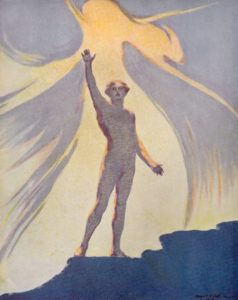Walt Whitman on What Makes a Great Person and What Wisdom Really Means
INSPIRATIONAL, 21 Dec 2020
Maria Popova | Brain Pickings – TRANSCEND Media Service
“The past, the future, majesty, love — if they are vacant of you, you are vacant of them.”
Twenty-four centuries after Pythagoras contemplated the purpose of life and the meaning of wisdom as he coined the word philosopher to mean “lover of wisdom,” Walt Whitman (May 31, 1819–March 26, 1892) contemplated the meaning of personhood and the measure of wisdom as he revolutionized the word poet to stand for “lover of life.”
Tucked toward the end of his ever-foliating Leaves of Grass is what might be his most musical poem — a sweeping thirteen-page symphony of thought and feeling and rhythm in language, undulating across three distinct thematic movements: the carefree optimism of embarking upon a new path; the transcendent self-discovery in traversing new landscapes of beauty and possibility; and the transcendence of the self in connecting with something larger than oneself: nature, time and space, love. Whitman himself considered it his “mystic and indirect chant of aspiration toward a noble life” and “a vehement demand to reach the very highest point that the human soul is capable of attaining.”
For his remaining decades, Whitman lived in it and with it for, changing its title from the humble “Poem of the Road” in the first 1856 edition to the wanderlustful “Song of the Open Road” in 1867, fine-tuning the verses again and again, mapping the poem’s 224 lines into fifteen numbered sections by the final edition in the winter of his life.
The second movement of the lyric symphony peaks at the sixth section, erupting with Whitman’s most direct and life-tested hypothesis about what makes a great person and what wisdom really means. It augurs his hard-earned wisdom on what makes life worth living, at which he would arrive half a lifetime later while recovering from a paralytic stroke. It echoes the famous prose-meditation on the key to a vibrant and rewarding life, with which he introduced Leaves of Grass as a young man. It hums, surefooted and sonorous, as a kind of blessing song for the road of life.
Now I see the secret of the making of the best persons,
It is to grow in the open air and to eat and sleep with the earth.Here a great personal deed has room,
(Such a deed seizes upon the hearts of the whole race of men,
Its effusion of strength and will overwhelms law and mocks all authority and all argument against it.)Here is the test of wisdom,
Wisdom is not finally tested in schools,
Wisdom cannot be pass’d from one having it to another not having it,
Wisdom is of the soul, is not susceptible of proof, is its own proof,
Applies to all stages and objects and qualities and is content,
Is the certainty of the reality and immortality of things, and the excellence of things;
Something there is in the float of the sight of things that provokes it out of the soul.
Now I re-examine philosophies and religions,
They may prove well in lecture-rooms, yet not prove at all under the spacious clouds and along the landscape and flowing currents.Here is realization,
Here is a man tallied — he realizes here what he has in him,
The past, the future, majesty, love — if they are vacant of you, you are vacant of them.
Complement with Whitman on optimism as a mighty force of resistance, what it takes to be an agent of change, how to keep criticism from sinking your soul, and women’s centrality to democracy, then revisit a beautiful reading from his furthest-seeing, deepest-feeling poem.
_______________________________________
Maria Popova
Brain Pickings is the brain child of Maria Popova, an interestingness hunter-gatherer and curious mind at large obsessed with combinatorial creativity who also writes for Wired UK and The Atlantic, among others, and is an MIT Futures of Entertainment Fellow. She has gotten occasional help from a handful of guest contributors. Email: brainpicker@brainpickings.org
Go to Original – brainpickings.org
Tags: Inspirational, Walt Whitman
DISCLAIMER: The statements, views and opinions expressed in pieces republished here are solely those of the authors and do not necessarily represent those of TMS. In accordance with title 17 U.S.C. section 107, this material is distributed without profit to those who have expressed a prior interest in receiving the included information for research and educational purposes. TMS has no affiliation whatsoever with the originator of this article nor is TMS endorsed or sponsored by the originator. “GO TO ORIGINAL” links are provided as a convenience to our readers and allow for verification of authenticity. However, as originating pages are often updated by their originating host sites, the versions posted may not match the versions our readers view when clicking the “GO TO ORIGINAL” links. This site contains copyrighted material the use of which has not always been specifically authorized by the copyright owner. We are making such material available in our efforts to advance understanding of environmental, political, human rights, economic, democracy, scientific, and social justice issues, etc. We believe this constitutes a ‘fair use’ of any such copyrighted material as provided for in section 107 of the US Copyright Law. In accordance with Title 17 U.S.C. Section 107, the material on this site is distributed without profit to those who have expressed a prior interest in receiving the included information for research and educational purposes. For more information go to: http://www.law.cornell.edu/uscode/17/107.shtml. If you wish to use copyrighted material from this site for purposes of your own that go beyond ‘fair use’, you must obtain permission from the copyright owner.
